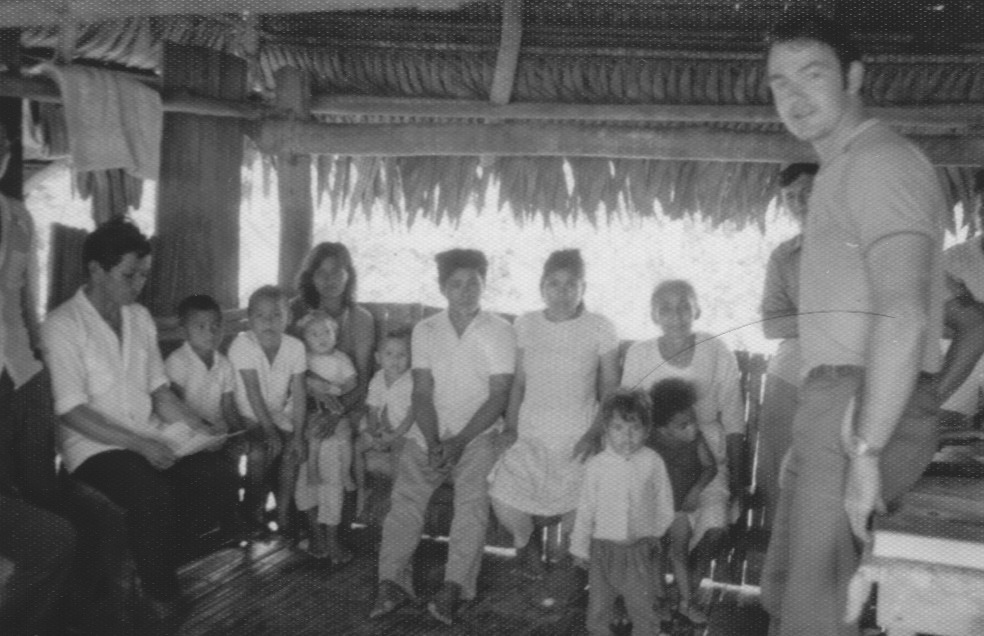 The cool rapid flowing waters of the Miriti River made a constant rumbling noise as it tumbled over the boulders and rapids in front of the main village of the Yucuna Indians in the heart of the Amazon jungle in southern Colombia. This tribe is one of over forty distinct tribes in the rainforest along the Brazil-Colombia border.
The cool rapid flowing waters of the Miriti River made a constant rumbling noise as it tumbled over the boulders and rapids in front of the main village of the Yucuna Indians in the heart of the Amazon jungle in southern Colombia. This tribe is one of over forty distinct tribes in the rainforest along the Brazil-Colombia border.
Dawn had brought the first light of the day revealing an exotic scene of about thirty small thatched huts with floors and walls made of the outer ring or “bark” of palm trees and a roof of the palm leaves weaved together forming a water-tight seal from the constant rain. A large maloca was the main meeting place where I had just spent the night in a hammock. The smoke of morning fires preparing the first meal of cooked yucca, fish, and platanos (green-black cooking bananas) was almost ready.
The morning mist hung over the seventy-five-yard wide Miriti river which was bordered by a steep bank rising to the base of enormous hundred-foot tall trees leaving a narrow opening in the endless tree-top canopy covering the jungle.
I had brought my Cessna floatplane down between the narrow overhanging tree limbs and landed the night before on one of the few straight stretches of the river just below the village then taxied on the river up to the village the night before.
Everyone goes to the river very early to wash up for the day’s activities in the cool river water. A few canoes had just pulled up to the bank beside the floatplane and were unloading about a dozen two- to three-foot catfish to be consumed that day by the few hundred people living in the village.
Watching this incredible morning scene that had gone on for hundreds of years with little change, I asked myself, “Why am I here?” There are so many other things I could be doing. None of my friends and family even knows this place exists. These people mean nothing to all the Christians I knew. Why should they be important to me? No one will ever know what it was like to live here or the risks of everyday life just to survive and enter into new areas. It was inevitable and important that I ask myself constantly, “Why am I here?”
It is not for the adventure, though there was plenty of that. It wasn’t for the comforts of home because there were not many of those. It wasn’t because there was any kind of personal benefit to me or my family because there were none that we ever could imagine. You don’t go to this kind of place thinking about yourself.
That morning after bathing and brushing my teeth I sat there on a rock with my feet dangling in the crystal clear water, praying and enjoying my talk with my Lord, thinking about this tribe, as well as another tribe the Yucunas had told me existed upriver, and another tribe on the Caquetá river called the Mirañas, as well as the Tanimucas, Lituamas, Ticunas and the Macunas. All of these tribe existed within 30 minutes flying time from our home. Then just beyond them to the north, I had heard that multiple groups of tribes lived, each with their own culture and language all of which were still unreached by the gospel message that so radically had changed my life.
My mind raced back to that day at the end of my junior year in high school when my Spanish teacher in a public school found the courage to share with me the amazing story of what Jesus did on the cross to pay for all my sins if I would only believe in Him and invite Him to be a part of my life from then on. I thought so often, “What if my teacher had never told me gospel?”
As those thoughts raced through my mind, I knew again why I was here: somehow over the next few years, I had to share the gospel with these dear Indian friends, or die trying!
My morning meditation was broken by the shouting of my friend, “Don Donaldo, venga para desayunar!” [Mr. Don, Come and eat breakfast]. My host would later become one of the pastors to the Yucunas, but that is another story.
